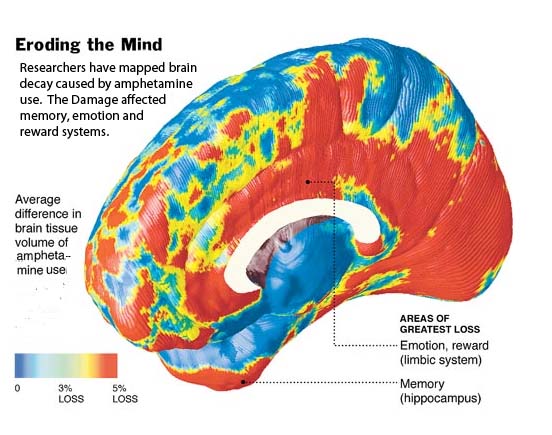
Phone: 508-717-4110 Email: neldc.org@gmail.com
ADHD Drugs, Amphetamines and Brain Damage

|
Adderall is an Amphetamine
The black box warning for Ritalin, Concerta, Adderall and Adderall XR are classified as amphetamines by the FDA. The Black Box Warning for these drugs reads as follows: "Amphetamines have a high potential for abuse. administration of amphetamines for prolonged periods of time may lead to drug dependence. particular attention should be paid to the possibility of subjects obtaining amphetamines fornon-therapeutic use or distributionto others and the drugs should be prescribed ordispensed sparingly.misuse of amphetamine maycause sudden death and serious cardiovascular adverse events." http://www.accessdata.fda.gov/drugsatfda_docs/label/2013/021303s024lbl.pdf
Neuron damage There is significant evidence that the drug can cause damage to the brain's neurons - the cells which are used for thinking. Amphetamine users have reduced concentrations of a chemical called N-acetyl-aspartate, which is a byproduct of the way neurons work. Research carried out in Torrance, California, and reported in the journal "Neurology", compared the brains of 26 previous methamphetamine users with 24 non-users. They found at least 5% lower concentrations of N-acetyl-aspartate in two key areas of the brain, the basal ganglia and frontal white matter.Dr Thomas Ernst, who led the project, said: "Many brain diseases associated with brain cell or neuronal damage or loss, such as Alzheimer's disease and other dementia, epilepsy, multiple sclerosis, brain tumors, stroke and HIV brain diseases, consistently have shown decreased N-acetyl-aspartate. "This, in the drug users' brains, suggests neuronal loss or damage as a result of long-term amphetamine use."
Amphetamines work by releasing large quantities of the brain stimulating chemical dopamine.
Animal studies have shown brain abnormalities persisting four years after amphetamine use stops.
Ritalin and other Amphetamines used for treatment of ADHD has continued to increase in the school population with apparently little or no real benefit in academic performance. China and Japan where ADHD medications are nonexistent in the school populations have continued to outpace American students who have the "advantage" of the ADHD medications.
Amphetamine users become dependent on the drug, and withdrawal symptoms cause actually cause hyperactivity and aggression. Regular use of ADHD drugs especially in the doses causes hallucinations, aggression, delusions and feelings of paranoia. [ Physicians Desk Reference]
Amphetamines and their salts such a Ritalin, Concerta and Addreall are neurotoxic especially in the higher doses, as a result brain damage can occur, number of brain cells and density of brain cells can be greatly reduced. This leads to irreversible cognitive impairment. Toxic-psychosis which resembles schizophrenia occurs. In addition amphetamines are cardiotoxic due to the damage they can do to the heart. Tachycardia which results from the amphetamine speeding up the heart rate is a direct cause of Microvascular Ischemic Disease of the brain in which tiny blood vessels in the brain break which prevents oxygen from getting to the vital parts of the brain.
In addition Amphetamine causes increases in heart rate and blood pressure, and can cause significant increases in cerebral blood flow with overall increases of around 30% and can be doubled in local regions of the brain, particularly the left frontal cortex. This activity can lead to haemorrhages and other forms of stroke such as microvasular ischemia. Karch et al, reviewing 413 methamphetamine-related deaths noted ten cases of subarachnoid and intracranial hemorrhage in the methamphetamine-related group and concluded: Methamphetamine use is strongly associated with coronary artery disease and with subarachnoid hemorrhage.
|
Learning Disabilities